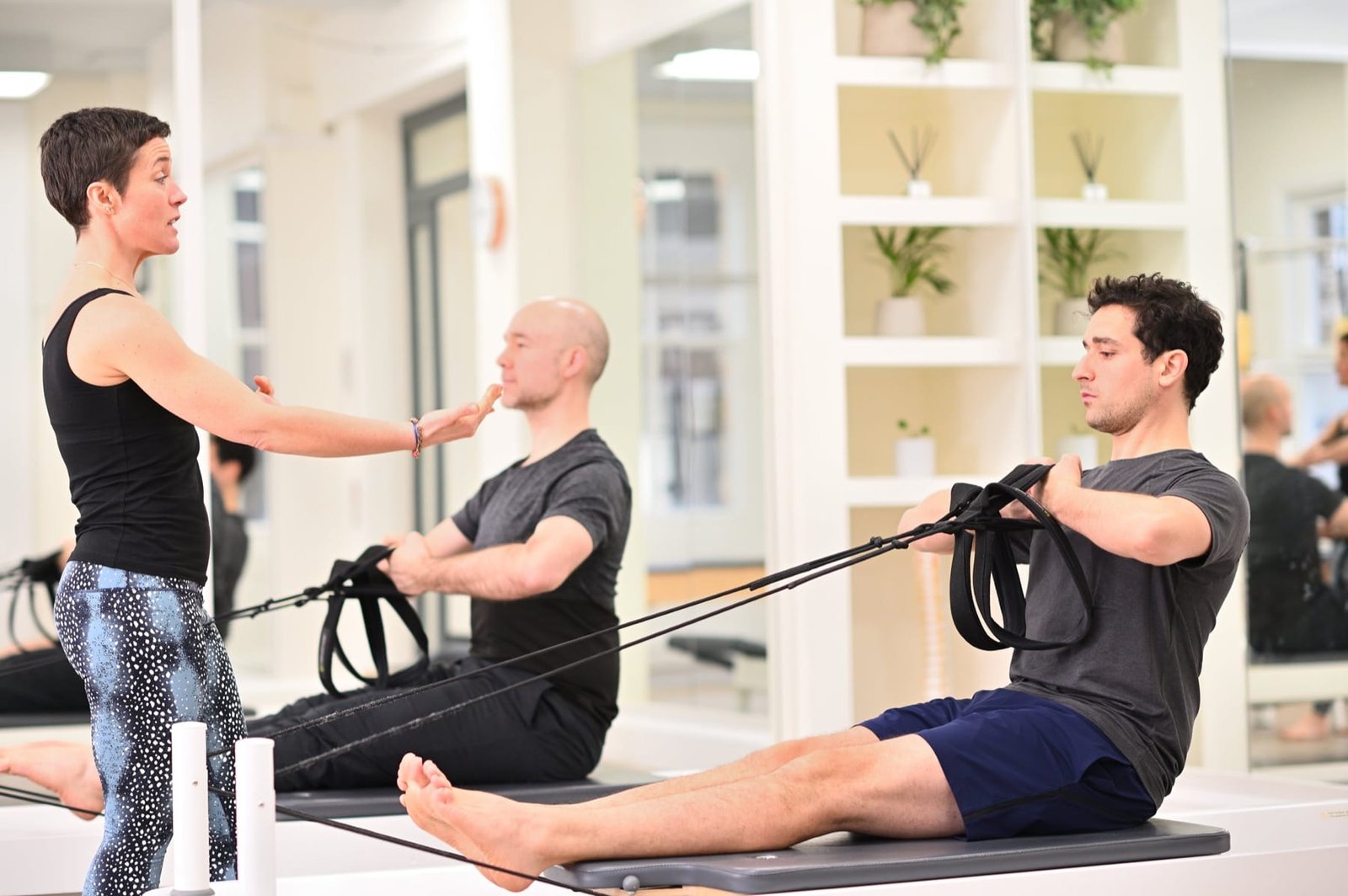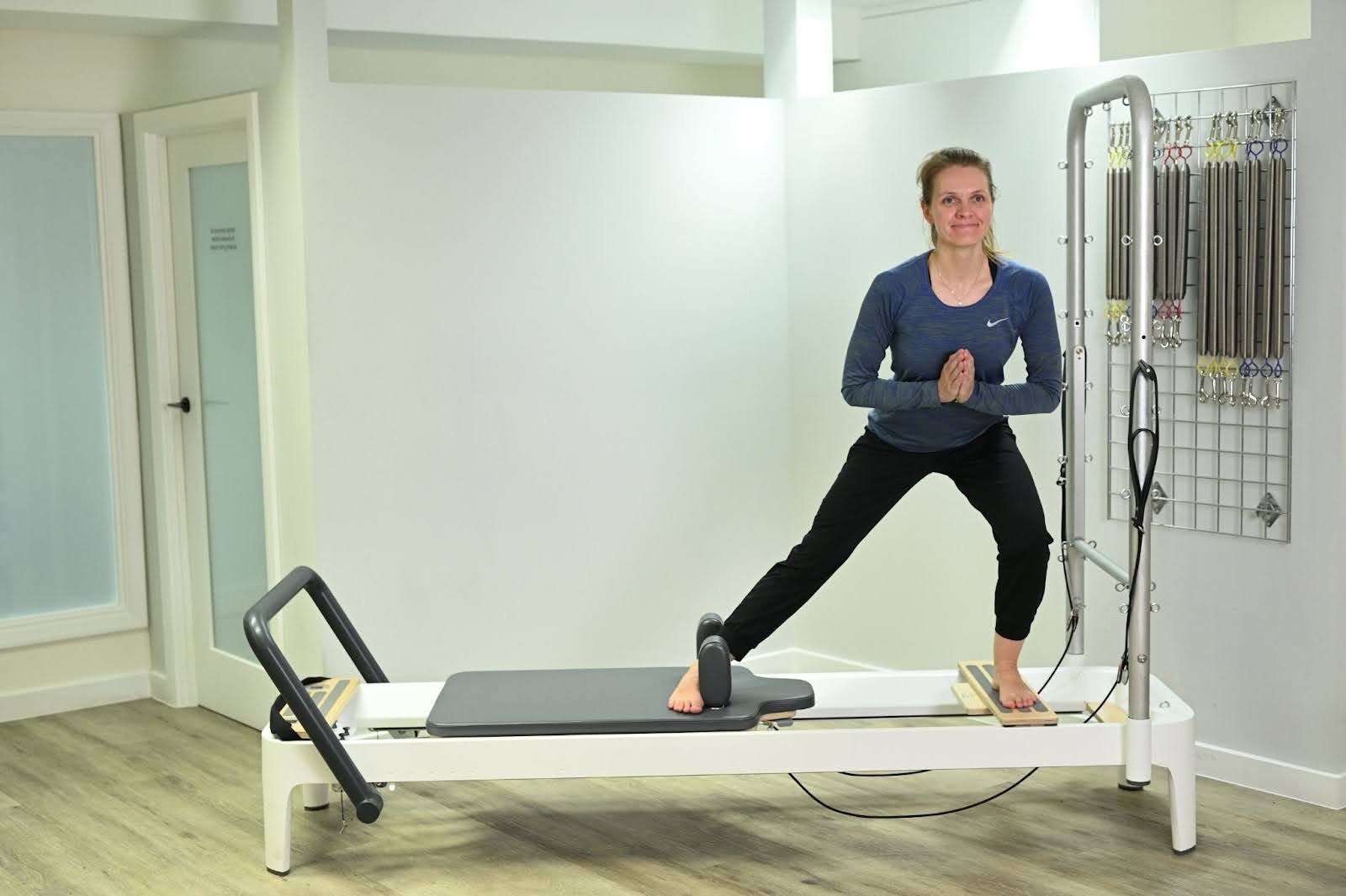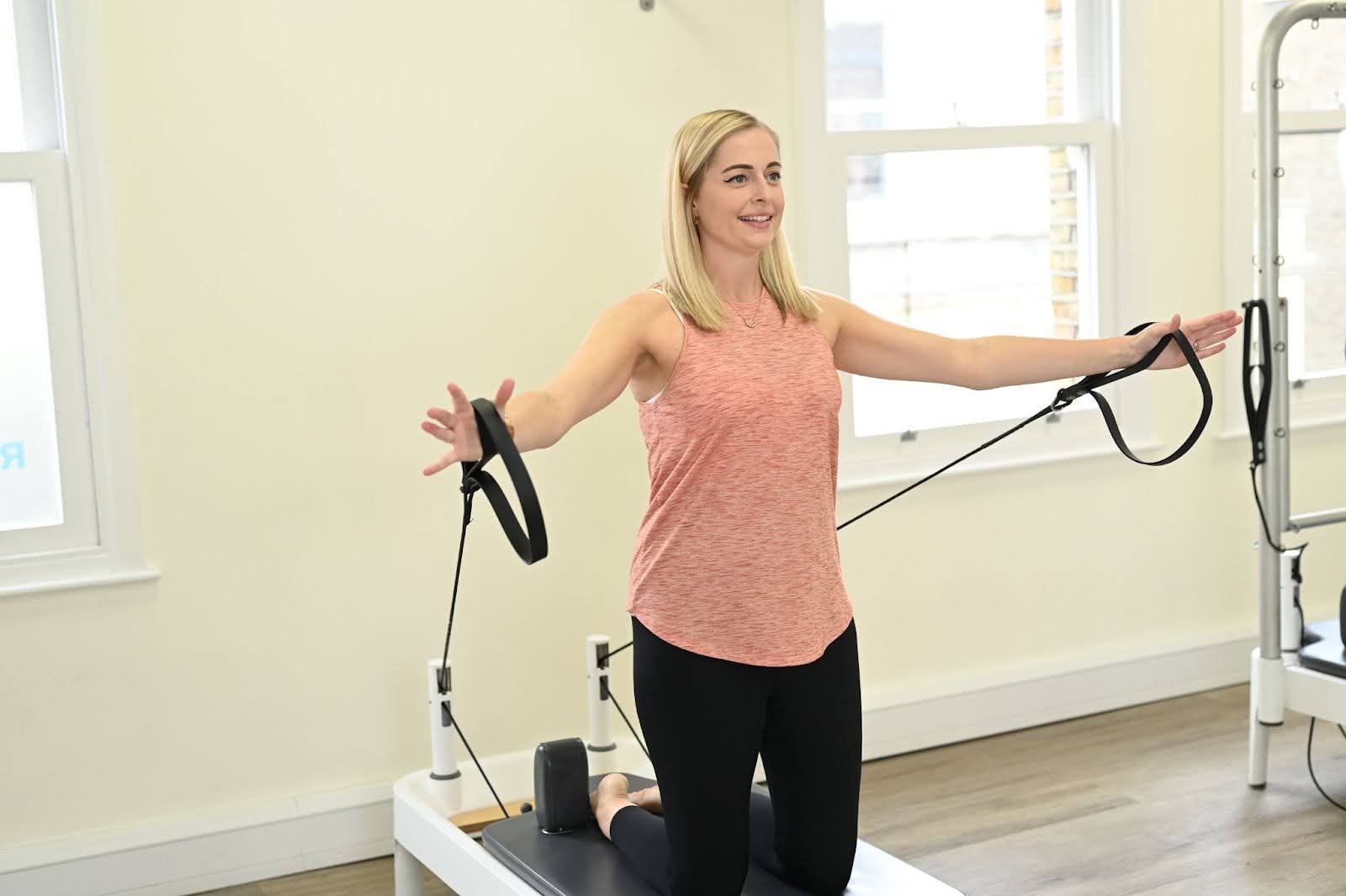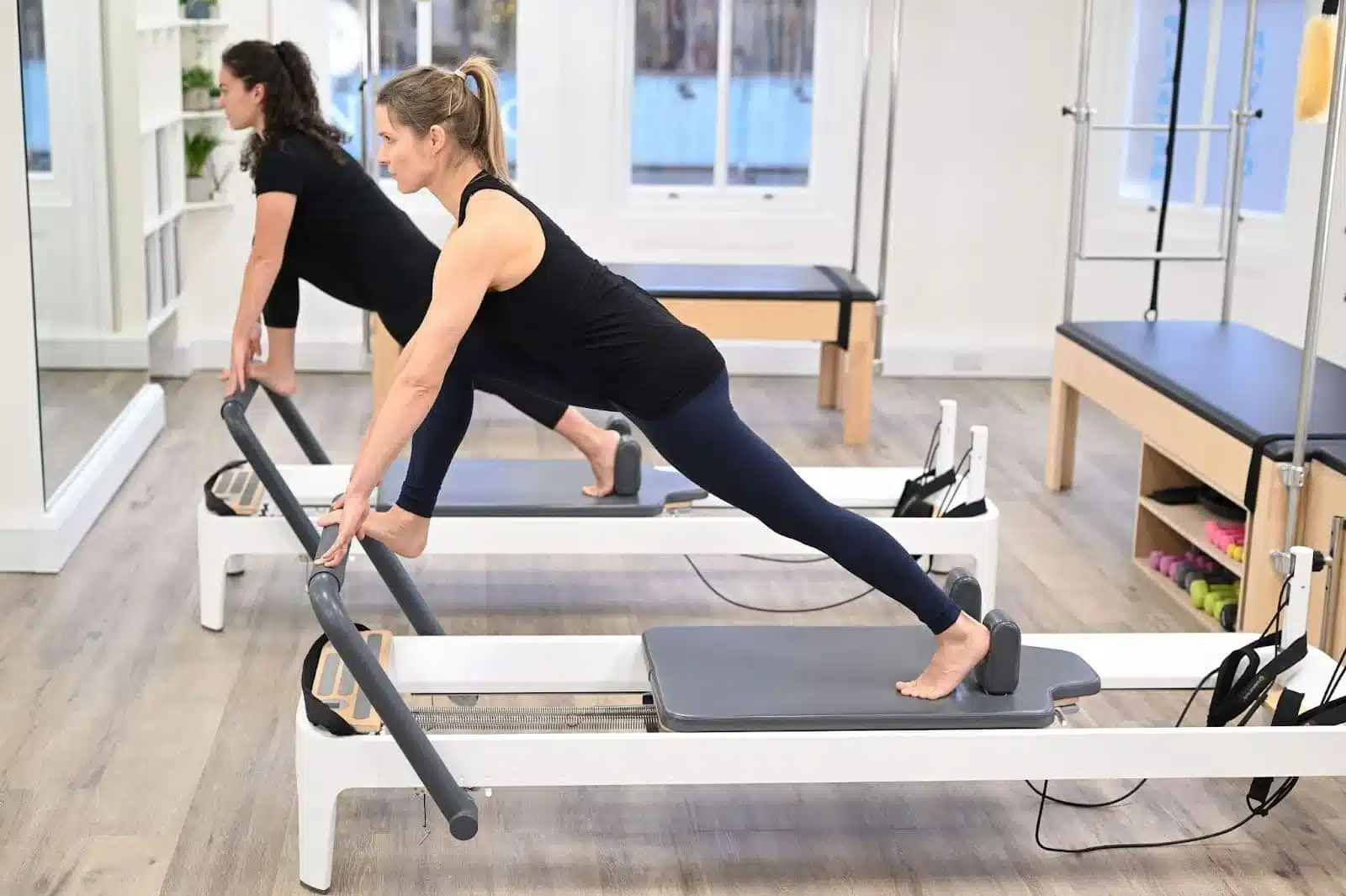Key Contributor: Susie Martin, Chartered Physiotherapist
Co-Contributors: Yael Shtrul, Clinical Pilates Instructor
Introduction
POV: you are thinking of starting reformer Pilates, but you realise you have no idea how often you should be doing this type of exercise!
How many sessions per week do you really need to see results from reformer Pilates? Well, that really depends on what kind of results you are after!
Reformer Pilates is a brilliant, versatile way of exercising, unlike any other. Reformer Pilates provides a full body workout, but is very different from working out in the gym. Reformer Pilates is not only used for general body conditioning and fitness but it is also so adaptable that it lends itself to physical rehabilitation.
How often you can do reformer Pilates each week depends on a variety of factors – including your schedule, your budget and your goals. However, chucking in the occasional workout when you feel like it, or when you get round to it, is unlikely to make a difference to you.
As with any type of exercise, frequency and consistency is necessary for changing your body – whether that be improving your cardiovascular fitness, working on your flexibility or building your strength.
Key Takeaways
- Reformer Pilates is a novel way of exercising that builds strength, stability, mobility, control, coordination and balance.
- Reformer Pilates is a mixture of different types of resistance training and therefore should be done 2 – 3 times per week, according to resistance training recommendations.
- The frequency with which you choose as an individual to train in reformer Pilates, depends on your schedule, budget and ease of access as well as taking into consideration what other type of exercise you may be doing and allowing for rest and recovery as well.

Your goals
Regular movement and mobility
If you are just getting started and you want to familiarise yourself with reformer Pilates and build up a foundational level of fitness then 1 – 2 times per week is a good place to start.
Rehabilitation
If you are recovering from an injury and you are using reformer Pilates as part of your rehabilitation then 1 – 3 times per week is suitable for you. Make sure that you are working with an appropriately trained physiotherapist or clinical Pilates instructor to ensure that your rehabilitation is appropriately guided.
Strength
If you are already quite fit and you want to build on your overall strength, your core strength, or work towards more muscle definition, then 2 – 4 times per week is recommended for you.
Athletic performance and cross training
If you are wanting to use reformer Pilates to enhance your performance in other types of fitness or sport then 1 – 3 times per week is great, depending on the rest of your training schedule.

What happens if you do reformer Pilates too often?
Whilst reformer Pilates is generally considered to be a low impact exercise, and therefore gentle on the body, that doesn’t mean it is always easy! Many of the advanced exercises use full body weight, and the spring resistance on the reformer can be very challenging to work against. For other exercises, working with reduced spring resistance can provide a wicked stability challenge.
Generally speaking, your Pilates practice should contribute to feeling strong and energised. It is normal to feel some tiredness and post exercise muscle soreness from time to time, but if low energy, fatigue, aches and pains are becoming the norm for you, this may be a sign that you are doing too much.
Recurrent niggling injuries, or injuries that take a long time to get better can also be a sign that you are doing too much. Plateaus in your progress can also signal that you may be doing too much.
It is important to evaluate your reformer Pilates sessions within the context of the rest of your training. If you are doing heavy reformer sessions as well as going to the gym, this could lead to overdoing things too.
If you notice that you seem to be in a perpetual state of fatigue, it is important to look at your training schedule throughout the week. You will need to reduce either the frequency or the intensity of your training sessions (or both).
Many people fall into the trap of thinking that they are only working their body when they are training, but when it comes to activities like strength training, the processes happening in your body that lead to you becoming stronger are largely happening when you rest.
This is when new muscle tissue is being created. Rest and recovery are as important a part of your training as the workout!
What do our experts say?
‘’I believe that to see real change, consistency is key. In my opinion, practicing twice a week is ideal. The best part is when you start to take what you learn in your Pilates sessions, things like better posture, greater body awareness, and improved alignment, and apply it to your everyday life. Whether it’s dancing, running, or just doing house chores, every movement becomes a chance to move with more intention and ease.’’ Yael Shtrul
How to build a sustainable Pilates routine?
One of the key features of a successful exercise routine is long term sustainability. Whatever you choose to do today, you want to be able to keep doing, in a month, in a year and possibly in a few years time. Working on your health and fitness is a long term project, rather than a short term fad.
Often, once we start something new, we are often so carried away with enthusiasm and the novelty that we throw ourselves wholeheartedly into a new routine…. only to burn out and give up a month later.
When you start out with Reformer Pilates, try committing to 1 – 2 sessions per week and then gradually increase to 2 or 3 sessions per week.
Another great tip for your Pilates routine is to combine group classes with one to one sessions with an instructor. This ensures that you get proper instruction in technique and form, which will help you to get the most out of your exercises. It will also help you to tailor exercises to your own personal needs, which should help you progress.
You can also combine reformer Pilates with any other type of exercise. For sustainable activity levels, try walking, swimming or cycling. If you need more challenge, you can combine it with strength training sessions or with high impact exercise.
Tips for getting the most out of your sessions
Be consistent
Pilates in general is about mind-body connection, breathing, body awareness, precision and control. Reformer Pilates is no different. Paying attention to your quality of movement and learning to control movement with precision is part of the Pilates technique. The better your technique, the more you will get out of each exercise.
Quality over quantity
Pilates in general is about mind-body connection, breathing, body awareness, precision and control. Reformer Pilates is no different. Paying attention to your quality of movement and learning to control movement with precision is part of the Pilates technique. The better your technique, the more you will get out of each exercise.
Use spring adjustments and props to keep progressing
Have you noticed, when you attend a group reformer class, that everybody has the springs set at the same tension? Did you know that the spring settings can be varied to suit different body types?
Varying spring tension can make exercises more challenging, and this means that you progress over time. In addition, small props like the magic circle, or overball can make exercises more challenging.
Choose your instructor carefully
Choosing the right type of instructor, or class for you, is really important for achieving your health and fitness goals.
Working with an instructor with a high quality training, means that you will learn proper technique and how to work safely with the equipment.
If you are just starting out and you need a slower paced class, focussing on proper technique, one to one and small group settings will be best for you.
If you are a fitness enthusiast with a great foundation level of strength and a good understanding of exercise technique, you may prefer a larger group ‘fitness’ style class.
FAQs
Is doing Pilates once a week enough?
Doing Pilates once a week is a very achievable amount of exercise. However, is this amount of exercise effective? Well, the answer is…. it depends…
If you are new to Pilates, or exercise in general, or you are returning to exercise following injury or illness, you may find that starting with Pilates once a week feels good for your body and you can notice improvements in your strength and mobility.
However, we would generally recommend that you do exercise on more days of the week for greater benefit. Pilates can be considered a low intensity form of strength training, and therefore it would be appropriate to do 2 – 3 times a week, in line with formal exercise recommendations.
You may wish to start out once a week and gradually build to 2 or 3 times per week, or you could substitute other types of exercise for those other days.
If you want to see fast changes in your strength, we would recommend 3 – 4 times per week.
Can I do reformer Pilates every day?
You can indeed do reformer Pilates every day! Reformer Pilates is very versatile, so you can vary your reformer sessions to have a different type of focus on different days of the week.
Reformer Pilates can be used to challenge your strength, or you can programme a session that focuses more on balance, mobility or technique. The beauty of reformer Pilates is that it is so versatile in this way.
Should I combine it with other workouts?
For a great well- rounded exercise routine, reformer Pilates can be combined with many other types of exercise, depending on your goals. If your goal is to get generally fit, then adding cardio exercise to your routine is necessary. If you want to improve your strength or your bone density, combining Pilates with strength training sessions in the gym will be best.
How often should you do reformer Pilates to see results?
It generally takes a few weeks to see noticeable changes when you commence any new type of exercise.
However, you will often feel different after just 1 or 2 sessions. You may feel like you are waking up muscles that you have not felt working for some time!
Conclusion
There is no one size fits all frequency for reformer Pilates, and this is because the ideal routine for you depends on your schedule, budget, goals, and any other exercise that you might be doing!
How often you should do reformer Pilates really depends on you! One session per week can make a difference, but more regular sessions will see you progress faster.
If you are not able to commit to more frequent reformer Pilates sessions, then you can blend your in-studio sessions with mat Pilates or strength workouts at home, and this will also help you improve your strength and mobility.
Whichever way you choose, consistency over the long term will help you to improve your strength, flexibility and your overall health.
Feeling inspired?
At Complete, we specialise in one to one reformer and equipment Pilates. If you want to experience high quality reformer Pilates with one of our expert instructors, book a session at one of our London studios today.
Our physiotherapist-led reformer Pilates studios in Chelsea, our Angel reformer Pilates studio and our reformer Pilates studio in the City, offer a highly tailored approach to your Pilates training, whether your goal is to manage a health condition, rehabilitate from an injury or to improve your strength and fitness.
Get in touch with us via email or contact us on 0203 764 5668 for further information.
Education is key:
These blogs are designed to give information to everyone, however, it is important to remember that everyone is different! If you have not seen one of our therapists and have any questions about injuries, what you have read or whether this may be useful to you, please just ask. We are more than happy to help anyone and point you in the right direction. Our biggest belief is that education is key. The more you understand about your injury, illness and movement, the more you are likely to improve.






